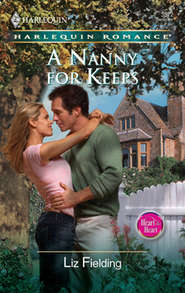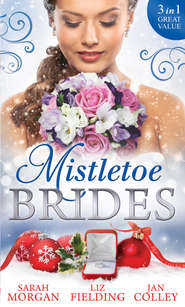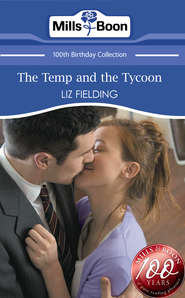По всем вопросам обращайтесь на: info@litportal.ru
(©) 2003-2025.
✖
Tempted by Trouble
Автор
Год написания книги
2019
Настройки чтения
Размер шрифта
Высота строк
Поля
‘Tea, then,’ he said, picking up the kettle, filling it and turning it on. He took a couple of mugs off the dresser and since the tea bags were stored in a tin with ‘TEA’ on the front—life was complicated enough without adding to the confusion—he found them without making a mountain out of a molehill. So far, he was doing better than either of her sisters ever managed. ‘Milk, sugar?’ he asked, dropping a bag in each mug.
She wanted to tell him to go and take the van with him, but he was right. They needed to get to the bottom of this.
‘Just a dash of milk.’
Was there any milk?
‘How about sugar? You’ve obviously had a shock.’
‘Of course I haven’t,’ she said, pulling herself together. ‘This is some kind of weird mistake. It has to be.’
They weren’t the most conventional family in the world, but they didn’t have secrets. Quite the contrary. Anyone would give him chapter and verse …
He glanced back to her.
‘What are you so scared of, Elle?’
‘I’m not scared!’
‘No?’
‘No!’ She’d faced the worst that the world could throw at her, but he was right, something about this put her on edge and, seizing on the fact that the kettle hadn’t come on to divert his attention, she said, ‘You have to give the plug a wiggle.’
He wasn’t diverted, just confused, and she reached behind him.
‘Don’t!’ Sean said as he realised what she was doing. He made a lunge in her direction, but not in time to stop her. There was a bit of a crackle and a tiny shock rippled up her arm, then the light came on and the kettle began to heat up noisily.
Her cheeks lit up to match but the rush of heat that invaded her body, starting at the spot where his hand was fastened over hers was, fortunately, silent.
Or maybe not.
Maybe the hammering of her pulse in her ears was so loud that Sean could hear it too, because he dropped her hand so fast that you’d have thought she was the one with dodgy wiring.
Without a word, he took a wooden spoon from the pot by the stove, used the handle to switch off the kettle and then removed the plug from the socket.
Whatever. Tea had been his idea.
But he wasn’t done. Having disconnected the kettle, he began opening the dresser drawers.
‘Excuse me!’
He held up a screwdriver he’d found in the drawer that contained bits of string, paper bags, the stuff that didn’t have any other home.
‘It’s beyond help,’ she told him. ‘It’s just …’ worn out, past its use by date, just plain old ‘… vintage. Like Rosie.’
‘It’s nothing like Rosie,’ he said, ignoring her protest as he set about taking the plug apart. ‘Rosie is not an accident waiting to happen.’
‘That’s a matter of opinion,’ she retorted.
‘No. It’s a matter of fact. She’s completely roadworthy or I wouldn’t be driving her.’ He looked up. ‘And I wouldn’t have brought her to you.’
‘No?’ Then, realising just how rude she was being, she blushed. ‘No, of course not. Sorry …’
‘No problem.’
‘I’m glad you think so,’ she said, only too aware of the envelope that was lying on the kitchen table with all the appeal of an unexploded bomb.
The Amery family had lived at Gable End for generations. This was the house Grandpa had been born in and it was marked with traces of everyone who’d ever lived there.
Their names were written in the fly-leaves of books that filled shelves in almost every room. Were scratched into the handles of ancient tennis racquets, stencilled onto the lids of old school trunks in the attic.
Their faces as babies, children, brides and grooms, soldiers, parents, grandparents, filled photograph albums.
There was no Basil.
Okay, there were gaps. Photographs fell out, were borrowed, lost.
Or had some been removed?
Gran had recognised the name. According to Sean, she hadn’t acted in the slightly silly, coy way she did when some man from the pensioners’ club chatted her up, and they often did because she was still beautiful.
She’d nearly passed out, he’d said. Panicked. And then there was Basil’s letter. He’d mentioned Bernard and referred to him as ‘my brother'. The connection was definitely there. Maybe she just didn’t want to believe it.
Taking a deep breath, she picked up the envelope—no one called her a scaredy-cat—and tipped the contents out onto the table so that he could see that she wasn’t trying to hide anything.
‘Here’s Basil’s letter,’ she said, offering it to Sean, who was leaning against the dresser, still poking about in the plug with the screwdriver. ‘You’d better read it,’ she said, thrusting it at him before turning her attention to the notebook.
On the first page, where a printed note said ‘In case of loss, please return to:’ the word ‘ROSIE’ had been written in block capitals, along with a mobile phone number. Presumably belonging to the phone on the table.
It was a page-a-day diary, she discovered, as she riffled through the pages, hoping for some clue. To the man. To his whereabouts.
There were appointments with names and telephone numbers by them. The occasional comment. Quotes by the famous, as well as Basil’s own wry or funny comments on the joys of ice cream. There were only a couple of recent entries.
‘He’s written “RSG” on yesterday’s date. Underlined. Do you know anyone with those initials?’
He thought about it for a moment, then shook his head.
‘That’s it, apart from “Service, Sean” written in the space for last Friday. Are you a mechanic? There’s a collection of vintage cars at Haughton Manor, isn’t there? Do you take care of them?’
‘They come under my care,’ he said. ‘Basil asked if I’d change Rosie’s oil, run a few basic checks to make sure everything was in good shape since he had some bookings. His back has been playing him up,’ he added, almost defensively. Doing little jobs on the side that his boss didn’t know about? Not her concern.
‘How much does he pay you?’ she asked. The last thing she needed was an elderly—vintage—vehicle that required high level, high cost maintenance, but she didn’t appear to have much choice in the matter. The mystery remained, but the connection between Basil and her family appeared to be proved.
He shrugged and a smile teased at the corner of his mouth, creating a tiny ripple of excitement that swept through her, overriding her irritation, and it occurred to her that a man like Sean McElroy could be seriously good for her state of mind.
‘Basil prefers to give payment in kind,’ he said.
‘Ice cream?’ She looked at him. The narrow hips, ropey arms. Her state of mind and all points south. ‘How much ice cream can one man eat?’











